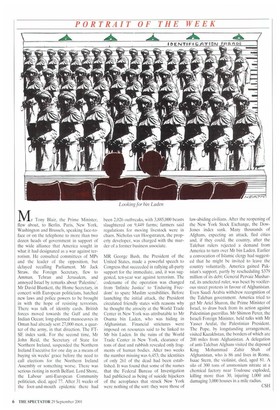M r Tony Blair, the Prime Minister, flew about, to Berlin,
Paris, New York, Washington and Brussels, speaking face-toface or on the telephone to more than two dozen heads of government in support of the wide alliance that America sought in what it had designated as a war against terrorism. He consulted committees of MPs and the leader of the opposition, but delayed recalling Parliament. Mr Jack Straw, the Foreign Secretary, flew to Amman. Tehran and Jerusalem, and annoyed Israel by remarks about 'Palestine'. Mr David Blunkett, the Home Secretary, in concert with European politicians, hatched new laws and police powers to be brought in with the hope of resisting terrorists. There was talk of identity cards. British forces moved towards the Gulf and the Indian Ocean; long-planned manoeuvres in Oman had already sent 27,000 men, a quarter of the army, in that direction. The FTSE index sank. For the second time, Mr John Reid, the Secretary of State for Northern Ireland, suspended the Northern Ireland Executive for one day as a means of buying six weeks' grace before the need to call elections for the Northern Ireland Assembly or something worse. There was serious rioting in north Belfast. Lord Shore, the Labour anti-European Community politician, died. aged 77. After 31 weeks of the foot-and-mouth epidemic there had
been 2,026 outbreaks, with 3,885,000 beasts slaughtered on 9,449 farms; farmers said regulations for moving livestock were in chaos. Nicholas van Hoogstraten, the property developer, was charged with the murder of a former business associate.
MR George Bush, the President of the United States, made a powerful speech to Congress that succeeded in rallying all-party support for the immediate, and, it was suggested, ten-year war against terrorism. The codename of the operation was changed from 'Infinite Justice' to 'Enduring Freedom' to spare Muslim sensibilities. Before launching the initial attack, the President circulated friendly states with reasons why he thought the atrocity at the World Trade Center in New York was attributable to Mr Osama bin Laden, who was hiding in Afghanistan. Financial strictures were imposed on resources said to be linked to Mr bin Laden. In the ruins of the World Trade Center in New York, clearance of tons of dust and rubbish revealed only fragments of human bodies. After two weeks the number missing was 6,453; the identities of only 261 of the dead had been established. It was found that some of the names that the Federal Bureau of Investigation had publicised as being of suicide hijackers of the aeroplanes that struck New York were nothing of the sort: they were those of law-abiding civilians. After the reopening of the New York Stock Exchange, the DowJones index sank. Many thousands of Afghans, expecting an attack, fled cities and, if they could, the country, after the Taleban rulers rejected a demand from America to turn over Mr bin Laden. Earlier a convocation of Islamic clergy had suggested that he might be invited to leave the country voluntarily. America gained Pakistan's support, partly by rescheduling $379 million of its debt; General Pervaiz Musharraf, its unelected ruler, was beset by vociferous street protests in favour of Afghanistan. Even Saudi Arabia withdrew recognition of the Taleban government. America tried to get Mr Arid l Sharon, the Prime Minister of Israel, to draw back from its action against Palestinian guerrillas. Mr Shimon Perez, the Israeli Foreign Minister, held talks with Mr Yasser Arafat, the Palestinian President. The Pope, by longstanding arrangement, visited Kazakhstan, the borders of which are 200 miles from Afghanistan. A delegation of anti-Taleban Afghans visited the deposed King Mohammad Zahir Shah of Afghanistan, who is 86 and lives in Rome. Isaac Stern, the violinist, died, aged 81. A silo of 300 tons of ammonium nitrate at a chemical factory near Toulouse exploded, killing more than 30, injuring 1,000 and damaging 3,000 houses in a mile radius.
CSH






































































 Previous page
Previous page